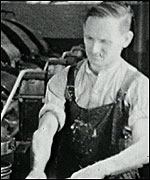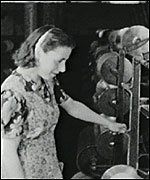|
A big family
Joe began working in textiles as a teenager, working
the looms at a mill producing towels and nappies for household across
the country and abroad.
"Even when I started there I was aware that the
industry was winding down," he recalls. "But I thought the kind
of work we were doing had a future in it - towels and nappies."
 |
| Working the looms |
Joe recalls that the work was noisy, hard, and sometime
dangerous - but the camaraderie amongst the workers made life at the mill
almost a pleasure.
"I was happy in my work," he recalls. "It
was like a big family. There's a lot of repetition in the mills, it's
boring work, so that meant a lot of joking between us all to keep our
spirits up.
"I recall there were one or two people who never
raised a smile in 25 years' work. What they got out of the job, I'll never
know."
When Joe first started his job he was 'trained up' before
being let loose on the looms alone.
"First the supervisor teaches you to tie knots and
put threads in, then how to find the right place when the weft breaks.
"After a few weeks you go onto one, two, three looms
- and then you go on a set. The you're on your own and make your own wage."
Bolton Fortnight
One of the highlights of the working year was Bolton
Fortnight, known elsewhere as 'Wakes Week'.
 |
| Blackpool was a popular holiday spot |
With only a few days' holiday a year, this was the only
opportunity to get away and see something of the country.
"I used to go with a lot of mates to Blackpool,"
he recalls. "We'd get on a double decker bus and play cards to pass
the journey. We stayed at a guest house in the town and for a fiver you
could have a good week's break.
"It was the only time you held a five pound note.
You'd fold it up and put it in your top pocket and feel really rich, until
you had to break it. By Thursday you'd be struggling.
"Drinking is what we did most of the time, even
though we were just fifteen. Girls were off limits in those days."
Dangerous and ageing work
The annual holiday was a welcome break from the dangers
of mill work.
Joe recalls that although the leather pulleys that caused
the most horrific injuries in mills had been replaced by electric motors
when he started work, there were still hazards.
"The main danger came from shuttles," Joe says.
"It didn't happen often, but if one flew out it could be really bad.
"I remember being clobbered by one once, right between
the eyes. It knocked me out for two minutes and I had to go to Bolton
Infirmary for X-rays."
"But there weren't that many accidents really."
But although accidents grew fewer in the latter days
of mills, breathing in fibres wasn't good for the human body.
"People were issued with cardboard masks, but it
was hot work so people didn't bother with them," Joe recalls. "You
weren't made to wear them, it was left up to you."
Overseas cotton brings gloom
The cotton industry was in gradual decline throughout
Joe's working life. Cheap imports combined with a lack of genuine government
support were blamed for the problems.
 |
| Women also worked in the mills |
"We started getting towels coming in from Spain,
Portugal, and America," Joe recollects. "But they had an English
label in because it went through our mill.
"You had to look really closely to see the writing
at the bottom where it gave country of origin. People
just saw an English label and bought them. That did for us."
Not only did cheap and subsidised cotton imports make
life tough for the mill workers, but the declining standard of the cotton
they worked with made it harder to earn a living wage.
"We started off weaving Egyptian cotton, which was
very good. Then came Hong Kong, then Spanish, and the standard declined,"
says Joe.
"The poorer the quality of the cotton the harder
it was to weave... it would break and the fibres were shorter. So the
looms stopped more often and we were less productive.
"It was all piece work and if your loom wasn't working
-because you were fixing the threads - then you weren't earning.
"Weaving seemed to be the only job where the harder
you worked the less you earned."
|

